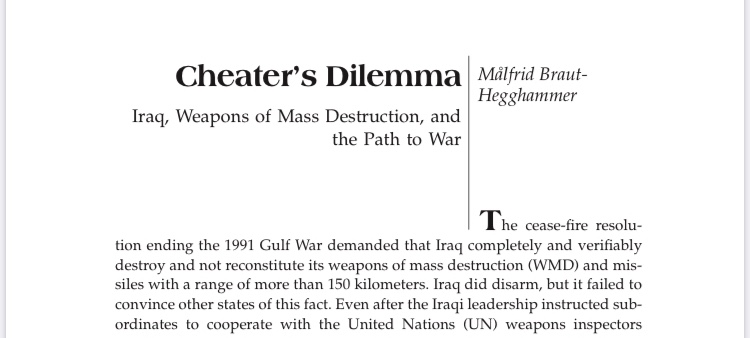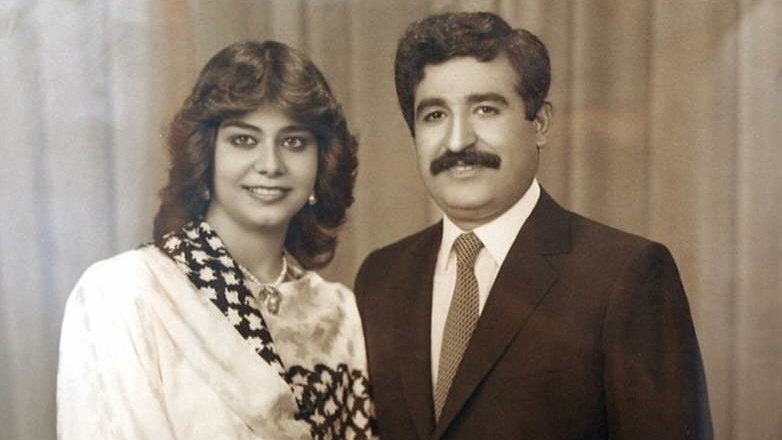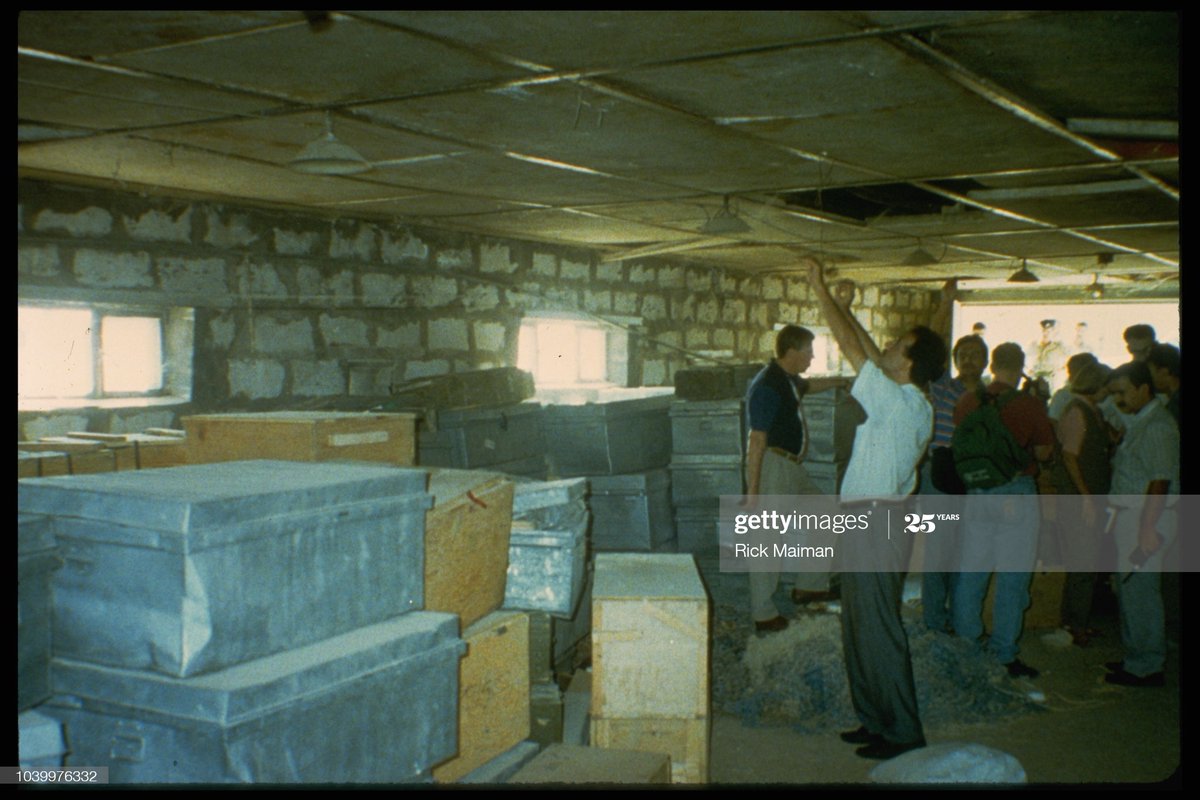Here´s a thread about my new article in International Security. It is about why Iraq disarmed of WMD, but failed to convince others that this was the case, leading to war in 2003. 1/n
Iraq faced a *cheater´s dilemma*: coming clean would not necessarily lead to rewards (Security Council lifting sanctions) but risked punishments (continuing sanctions & military strikes). Iraq was a defeated state facing a unified Security Council in 1991. What to do? 2/n
Background: UN inspectors (IAEA & UNSCOM) went to Iraq to verify WMD disarmament & nonproliferation after the 1991 Gulf War. Ambassador Rolf Ekeus led this effort, here seen arriving in Baghdad to meet Iraqi officials. 3/n https://www.youtube.com/watch?v=3Ln9b2k2WGI">https://www.youtube.com/watch...
The cover-up: Iraq first denied many aspects of its WMD programs, then panicked. They destroyed WMDs in secret in the summer of 1991. UN inspectors found evidence of WMD programs & concealment, leading to crises (e.g. a parking lot show-down). 4/n ( https://www.nytimes.com/1991/09/28/world/44-un-inspectors-freed-by-iraq-with-secret-nuclear-documents.html)">https://www.nytimes.com/1991/09/2...
Iraq now faced more criticism and new demands to give historical accounts of all WMD activities. This made their cheater´s dilemma worse. The Iraqi leadership did not want to admit to its past use of chemical weapons against civilians, for example. 5/n https://www.lawfareblog.com/poisonous-affair-america-iraq-and-gassing-halabja-joost-r-hiltermann">https://www.lawfareblog.com/poisonous...
The problem: UNSCOM could not verify how much WMD Iraq had destroyed in 1991. Gradually Iraq admitted more, but still denied BW weaponization. The Iraqi leadership debated: would full disclosure lead to sanctions being lifted? Or to sanctions for ever? 6/n https://www.youtube.com/watch?v=zuz5_V_A5oY">https://www.youtube.com/watch...
(see my article for details from their discussions behind the scenes in Baghdad!) 7/n
Plot twist! Hussein Kamil defects to Jordan in August 1995. He had masterminded the initial denial of WMD programs to the UN. He also told staff to ignore Saddam’s orders. I.e. his father-in-law. 8/n
Here´s where it gets interesting: after arriving in Jordan Kamil said he would not reveal secrets. This was true: he did not say everything he knew about past WMD activities. 9/n https://www.youtube.com/watch?v=52C8IHreWaY)">https://www.youtube.com/watch...
So what did Kamil tell Ekeus & his colleagues in Amman? See a leaked transcript here: (10/n)
http://www.casi.org.uk/info/unscom950822.pdf">https://www.casi.org.uk/info/unsc...
http://www.casi.org.uk/info/unscom950822.pdf">https://www.casi.org.uk/info/unsc...
Coming clean: The Iraqi leadership did not know what he would reveal. They decided to preempt him by handing over previously hidden WMD documents to Ekeus & UN inspectors before they met Kamil in Amman. 11/n
Iraq hoped this would be a turning point. Instead, many became convinced that Iraq had more to hide – especially as the Chicken Farm docs appeared to be sanitized & incomplete. Also, Iraq& #39;s efforts to explain how they had "suddenly" found the docs were plainly ridiculous. 12/n
Shots fired! The Jordanians soon lost interest in Kamil because he didn& #39;t spill more secrets. He went back to Iraq in early 1996, and was killed in a shoot-out along with his brother & relatives. 13/n https://www.washingtonpost.com/archive/politics/1996/02/24/iraqi-defectors-killed-on-return-to-baghdad/d49fc14b-e415-42f7-8c61-dc64f548d7f5/">https://www.washingtonpost.com/archive/p...
“Coming clean” about the concealment effort Kamil had organized to the UN came close to criticizing Saddam, who had supported Kamil. It also meant talking about the security apparatus. As a senior Iraqi official put it, talking about Kamil was like walking into a minefield. 14/n
Pervasive principal-agent problems came in the way of greater transparency. Subordinates feared asking questions & made mistakes. They acted based on their assumptions about regime intent, not new orders. Some hid docs & ignored orders to hand these in. 15/n
As regime survival was on the line in 2002-03, senior Iraqi officials struggled to convince staff to fully cooperate w/UN. They went beyond Saddam& #39;s mandate to increase cooperation on occasion. But they could not prove a negative: the absence of WMD. 16/n https://www.youtube.com/watch?v=EIxJzWyQv3M">https://www.youtube.com/watch...
The findings in this article challenge what has become the conventional wisdom about why Iraq “failed to come clean”: not because it wanted to deter Iran through ambiguity, but because of the workings of the cheater& #39;s dilemma. /fin #authorsTabList">https://www.mitpressjournals.org/doi/abs/10.1162/isec_a_00382 #authorsTabList">https://www.mitpressjournals.org/doi/abs/1...

 Read on Twitter
Read on Twitter




